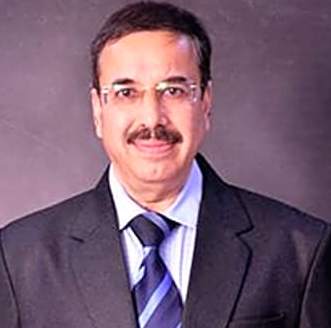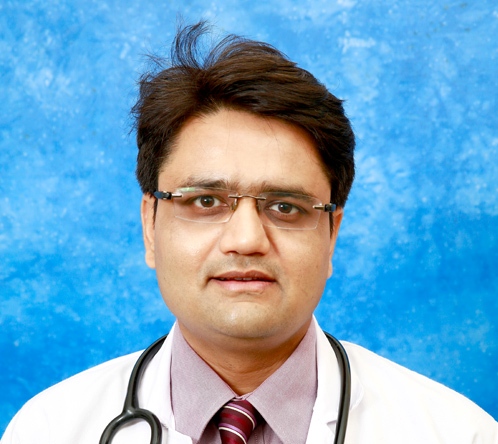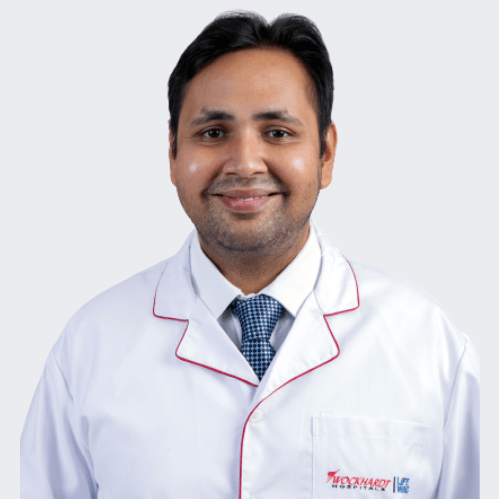Home » Speciality » Digestive Care
DIGESTIVE PROBLEMS
TREATMENT

Why choose Wockhardt Hospitals
for Gastroenterology Treatment?
When it comes to providing the best treatment for Gastroenterology, Wockhardt Hospitals is the top choice. We have established a strong presence in the healthcare industry and are known for offering effective treatment options to our patients. The Department of Gastroenterology at Wockhardt Hospitals is renowned for providing precise diagnoses and effective treatments for digestive systems.
We do not compromise the health of our patients, and it has always been our priority. Therefore, we’ve incorporated advanced technologies along with state-of-the-art infrastructure accompanied by well-trained professionals to take care of our patients. Moreover, our medical specialists use minimally invasive gastroenterology procedures and related processes so the condition can be treated with less pain experienced by our patients. We aim to deliver the best healthcare services with cutting-edge technology and world-class medical facilities.
Renowned Gastroenterology
at Wockhardt Hospitals
- Mumbai Central
- Mira Road
- Nagpur
- Rajkot
What is Gastroenterology?
Gastroenterology is the study of understanding the normal functioning of digestive systems and diseases related to the gastrointestinal tract (GI) and digestive system, including the esophagus, stomach, small intestine, large intestine, pancreas, gallbladder, etc. The digestive system moves food into the GI tract through peristalsis (rhythmic contractions and relaxations). Then, digestive juices act on them and break the complex materials into simple ones for easy absorption and remove the waste via defecation.
A medical expert who is proficient in the gastroenterology field is known as a gastroenterologist who specializes in understanding the physiology of the above organs and curing the related ailments to ensure the smooth functioning of the gastrointestinal tract. Some of the conditions treated by gastroenterologists include gastrointestinal bleeding, gastroesophageal reflux disease, irritable bowel syndrome, biliary tract disease, gallbladder disease, etc.
Symptoms of Gastroenterology Disease
If you’ve constant complaints about digestive problems, such as nausea, heartburn, or abdominal pain, it indicates that your gastrointestinal functions are hampered. The doctor may recommend over-the-counter pills or other drugs to prevent symptoms from getting worse.
The symptoms of gastroenterology conditions vary from disease to disease. However, general symptoms may include,
- Bleeding in the digestive tract
- Abdominal discomfort and pain
- Constipation
- Diarrhea
- Difficult swallowing
- Ulcers
- Indigestion and heartburn
- Vomiting, nausea, stomach upset
- Weight loss
- Itchiness
- Fatigue
- Dark Urine
- Yellowish discolouration of the skin and mucous membranes
- Paler than usual stool
Visit a medical professional if you see signs and symptoms of the following gastrology conditions.
Heartburn – If you experience heartburn for more than 6 months, you might be suffering from gastroesophageal reflux disease (GORD).
Irritable bowel syndrome – The condition may not cause permanent damage but can significantly affect your lifestyle. Symptoms include;
- Constipation
- Diarrhea
- Bloating
- Abdominal pain
- Cramping
Inflammatory bowel disease- The condition is characterized by inflammation in the intestines. Symptoms are;
- Joint pain
- Chronic abdominal pain
- Rectal bleeding
- Loss of appetite
- Diarrhea
What are the main causes
of Digestive Problems?

Many factors contribute to the causes of digestive issues. Some of these are-
- Poor diet- A diet rich in fats, sugars, and low fiber causes difficulty in the movement of stool through the colon. Also, a deficiency of water causes constipation worsening the situation.
- Bacterial or viral infection- Pathogens such as bacteria and viruses can enter the body through contaminated food, water, or surface contact. These then affect digestion and cause diarrhea.
- Auto-immune diseases- In such disorders, the immune system attacks the body cells of its own and can involve any part of the digestive tract.
Required Tests for
Gastroenterology Treatment
Required Tests for Gastroenterology Treatment
There are multiple diagnostic tests to spot gastrology problems.
- Blood tests- These involve gastroenterology tests like blood count, lactose tolerance test, and liver function test, which can help diagnose GI conditions such as intestinal infection, cause of diarrhea, etc.
- Stool analysis- It assesses the overall health of your gut. It helps analyze normal physiological functions such as digestion and absorption, along with a microbial presence in the gut. This test can be advised to diagnose conditions such as diarrhea, constipation, infection, malabsorption, etc.
- Endoscopy- Conditions such as heartburn, changes in bowel patterns, and excessive weight loss need a detailed diagnosis. Here's when endoscopy plays a role. This is a non-surgical process that uses an endoscope (a thin tube with a camera) that examines the digestive tract to check for diseases. This method can also help to detect cancerous cells.
- Ultrasound- The medical gastroenterology procedure uses high-frequency sound waves to generate 3D images of the organs. It's used to examine abdominal organs, including the pancreas, liver, and gallbladder.
- CT Scan (Computerized Tomography)- The technique uses X-rays which generate cross-sectional images of the organs to identify the cause of diseases.
- MRI (Magnetic Resonance Imaging)- Magnetic and radio waves are inserted into the body that give precise images of organs with any damage or cancerous cell growth.
What do our
Gastroenterologists treat?
Gastroenterologists at Wockhardt Hospitals specialize in treating different gastrointestinal and digestive system problems. These include
- Irritable Bowel Syndrome (IBS)
It is a group of symptoms that affects your digestive system. It’s an uncomfortable gastrointestinal disorder, and people having this condition usually suffer from cramps, excessive gas, and abdominal pain. People with IBS have low pain tolerance. Their colon muscles tend to contract more compared to normal people, which causes cramps. Bacteria and viruses are the underlying causes of IBS.
- Small intestinal bacterial overgrowth (SIBO)
In this condition, the bacteria that live in our small intestine overgrow and affect the normal physiology of the digestive system. These are wrong bacteria or something that works opposite to good bacteria. They feed on products that aren’t meant for them and undergo chemical reactions in the gut, causing problems. SIBO occurs due to changes in the number of digestive enzymes, such as bile juice and gastric acid.
- Food allergies
They occur when your body reacts against a specific protein in some foods. Food allergies may be genetic or can be caused due to conditions like eczema or hay fever. People with asthma can also experience this.
- Gallstones
Besides these conditions, our doctors are also specialized in treating related GIT disorders such as appendicitis, stomach ulcers, fatty liver disease, etc.
When to see
a Gastroenterologist?
Here are some gastrology signs that can give you an indication of when to visit a gastroenterologist.
- Ongoing diarrhea
From medications to food infections, anything can cause diarrhea. If you are passing more liquid stool than solid, it’s time to visit a gastroenterologist. Chronic diarrhea is an indication of a few digestive disorders, including SIBO and IBS. Therefore, it’s better to consult a doctor to avoid complications.
- Severe or frequent heartburn
Occasional heartburn can be cured at home, but if you’re experiencing heartburn symptoms for a few weeks, they shouldn’t be ignored. These might be signs of chronic acid refluxes that damage your esophagus.
- Unusual bloating
Bloating is having a feeling of a tight belly which can happen due to excessive gas production. Constipation can cause bloating, and a gastroenterologist can help you identify the cause and provide you with a better Gastroenterology treatment.
There could be some conditions like abdominal pain, rectal bleeding, etc., where you must consider visiting a gastroenterologist.
We offer Quality Facilities
to Our Patients
The Department of Gastroenterology at Wockhardt Hospitals offers multiple services and gastroenterology tests, from diagnosing the condition to providing effective treatments. We use advanced technologies to provide the best treatment for digestive ailments. Apart from that, we have 24/7 availability of ambulance and medical staff who are ready to help you out throughout your time with us. Besides that, we have well-furnished and equipped wards, labs, and cafeterias, so you or your family members may not face any difficulty.
FAQs
Q. Can digestive problems be cured?
Q. Are digestive problems serious?
Q. What is a gastroenterologist's consultation fee at Wockhardt Hospitals?
Consultation fee ranges for a full gastroenterology checkup costs around Rs 2800. However, the price can change depending on the location.
Q. Can a gastroenterologist treat piles?
Q. What does a gastroenterologist do on the first visit?
Q. What are the warning signs of having Gastroenterology disorders?
- Bloating
- Constipation
- Diarrhea
- Incontinence
- Heartburn




























